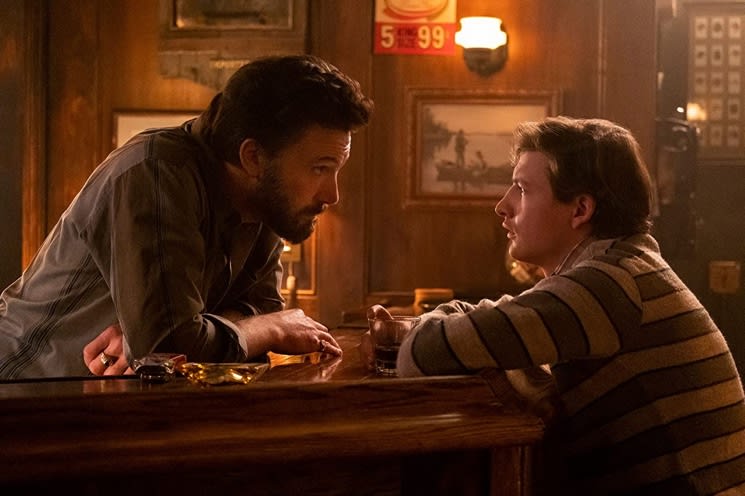The Tender Bar is a laid-back, coming-of-age story that at times struggles with pacing, but Ben Affleck's relaxed, low-key charm keeps the film afloat.
Based on Pulitzer-winning journalist J.R. Moehringer's 2005 memoir of the same name, The Tender Bar is George Clooney's latest outing as director. Set in 1973, the film opens with 11-year-old J.R. (Daniel Ranieri) and his mother (Lily Rabe) who move back to her family home in Manhasset, where her brother Uncle Charlie (Ben Affleck) lives along with their father. J.R.'s deadbeat dad is out of the picture, and Uncle Charlie becomes the closest father figure in his life.
Charlie is a bartender at a place called the Dickens, which has a wide selection of books that line the shelves behind the bar. He shares words of wisdom about "the male sciences" with the young boy, encouraging him to write and read while respecting women and himself, and teaches him the golden rules of the bar. Young J.R. soaks in every word, aspiring to be like Charlie. Without being overdramatic or flashy in any way, this scene packs a punch.
The film moves forward to J.R.'s college years (where he is played by Tye Sheridan); his mother desperately wants him to go to Yale, and, with a fierce sense of loyalty to her, he successfully gets in. These years focus on friendships and first love, and his stint at The New York Times.
It's impossible to watch The Tender Bar without feeling Clooney's looming presence over it — his fondness for the '70s-set material and the characters is palpable, especially for Uncle Charlie, who serves as the heart of the story. Affleck brings sincerity to the relaxed, laid-back role as the charming, smart and well-read father figure, who is also aware of his own flaws. His absence is certainly felt when the film drifts off to J.R.'s college years.
The strongest moments are fondly weaved together when Affleck and Ranieri share the screen as uncle and nephew. Tye Sheridan, for his part, anchors the moments that require his character to tackle his daddy issues, which he says he doesn't have.
The film, however, is not without its flaws, as the slow pace drags at times. Some unnecessary storylines are added and then abandoned. For instance, the mother's cancer scare starts and ends abruptly. Lily Rabe, who's always a joy to see on screen, feels underused. She's left on the sidelines in moments that could have used much more of her.
The film doesn't deal with heavy-handed drama or life-altering conflicts, as audiences may expect from a drama; instead, Clooney lets the characters dance away, bringing J.R.'s memoir to life quietly and affectionately. If not for the drama, stay for Affleck's acting. Only a fine actor can stand on the sidelines in a supporting role and still steal the show.
(Amazon)Based on Pulitzer-winning journalist J.R. Moehringer's 2005 memoir of the same name, The Tender Bar is George Clooney's latest outing as director. Set in 1973, the film opens with 11-year-old J.R. (Daniel Ranieri) and his mother (Lily Rabe) who move back to her family home in Manhasset, where her brother Uncle Charlie (Ben Affleck) lives along with their father. J.R.'s deadbeat dad is out of the picture, and Uncle Charlie becomes the closest father figure in his life.
Charlie is a bartender at a place called the Dickens, which has a wide selection of books that line the shelves behind the bar. He shares words of wisdom about "the male sciences" with the young boy, encouraging him to write and read while respecting women and himself, and teaches him the golden rules of the bar. Young J.R. soaks in every word, aspiring to be like Charlie. Without being overdramatic or flashy in any way, this scene packs a punch.
The film moves forward to J.R.'s college years (where he is played by Tye Sheridan); his mother desperately wants him to go to Yale, and, with a fierce sense of loyalty to her, he successfully gets in. These years focus on friendships and first love, and his stint at The New York Times.
It's impossible to watch The Tender Bar without feeling Clooney's looming presence over it — his fondness for the '70s-set material and the characters is palpable, especially for Uncle Charlie, who serves as the heart of the story. Affleck brings sincerity to the relaxed, laid-back role as the charming, smart and well-read father figure, who is also aware of his own flaws. His absence is certainly felt when the film drifts off to J.R.'s college years.
The strongest moments are fondly weaved together when Affleck and Ranieri share the screen as uncle and nephew. Tye Sheridan, for his part, anchors the moments that require his character to tackle his daddy issues, which he says he doesn't have.
The film, however, is not without its flaws, as the slow pace drags at times. Some unnecessary storylines are added and then abandoned. For instance, the mother's cancer scare starts and ends abruptly. Lily Rabe, who's always a joy to see on screen, feels underused. She's left on the sidelines in moments that could have used much more of her.
The film doesn't deal with heavy-handed drama or life-altering conflicts, as audiences may expect from a drama; instead, Clooney lets the characters dance away, bringing J.R.'s memoir to life quietly and affectionately. If not for the drama, stay for Affleck's acting. Only a fine actor can stand on the sidelines in a supporting role and still steal the show.
